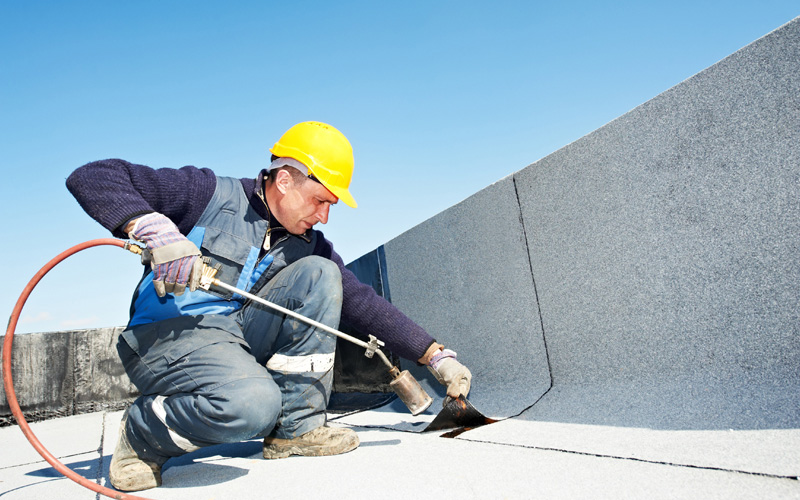How To Save Money On Commercial Roof Maintenance
MUCH NEEDED INFORMATION WHICH WILL SAVE YOU THOUSANDS OF DOLLARS WHEN YOU CONSIDER THAT IT WILL TAKE 35 PLUS YEARS TO WRITE OFF CAPITAL IMPROVEMENT ON YOUR ROOF.
We live in a society where service and maintenance are written with capital letters. Insurance companies give discounts to participants’ in-group plans who promise to get involved in preventative maintenance. We change the oil in our engines routinely to prevent premature engine failures. We periodically paint and clean the exteriors of our buildings, bridges and other structures to prevent rust or wood decay.
When it comes to our roofs, however, we are negligent. We should realize that a roof needs as much or more maintenance than any other building component. The roof is our first line of defense against the elements: sun, water, ice and snow. Despite this, most of us are not willing to routinely inspect and practice preventative maintenance to extend the life expectancy of a roof.
Most of us think of a roof as an asphaltic surface that may get some blisters and some splits and some water here and there – big deal! But a roof is much more than that. A commercial or industrial roof consists of a steel deck, insulation and a waterproofing membrane. Individually, each component will not provide us with the weatherproofing that is needed. But together, they become an integrated roof assembly that can protect your building for many years.
As a commercial roof ages, the waterproofing membrane begins to deteriorate and leak. Without proper maintenance and care, we can also lose the value of the insulation and the physical integrity of the deck, which is the most costly to replace.
The staining of two or three ceiling tiles would signal the presence of a small leak to most, but a greater threat may exist. Insulation on top of the deck may be absorbing water like a sponge, wicking and spreading the moisture into a much larger area.
Therefore, it is of utmost importance that you have a qualified roofing contractor make routine inspections at least twice a year and perform preventative maintenance services. Maintenance inspections may only require the cleaning of roof drains that are mysteriously clogged with all manner of debris…beer cans, tennis balls, wood and even animal bones. Animal bones are often found on roofs after they have been picked clean by birds. The bones are light and easily flushed with flowing water into the lower areas where the drains are located and can cause immense problems.
The IRS ruled several years ago that a new commercial roof can be capitalized over a period of 30 years. Therefore, it is more important than ever to maintain your roof, so that you can extend the life expectancy and receive the maximum value for your roof.
Questions you should ask before choosing a contractor
1. Can you provide a list of former customers as references?
In addition, ask for bad references. Any contractor can deliver a list of good references – not all projects go as planned. You will find out how the contractor performs when things do not go well.
2. Can you provide me with a current copy of your insurance certificate? In particular, copies of liability coverage and workers’ compensation certificates. Share the insurance certificate with your insurance agent for coverage and validity.
3. Can you provide me with copies of proposed assemblies and details from the manufacturers’ published literature?
4. Will you furnish me with a copy of the proposed warranty?
5. Will you submit a maintenance program for the new roof system? Most roofing contractors will not offer a maintenance program for your roof once it is installed. Regular inspections of the new roof will allow for potential problems to be caught early and remedied before they cause substantial damage.
6. Can you provide a list of the manufacturers with which your company is a licensed or approved applicator? Most roof systems require special application expertise to achieve lasting quality.
7. What type of safety training do you provide for your workers and what industry education programs have they attended? The best roofing contractor is only as good as the workers who install the roof system. An emphasis on safety ultimately lowers the cost
of doing business, and further assures that your job will go smoothly.
8. Who will inspect your crew’s work after they have installed your new roof? A good roofing contractor should have a quality assurance program. Use third party inspection (RRC, Manufacturer’s representative, etc.)
9. Are you a current member of any local and national roofing associations, i.e. the NRCA, C.S.I., NAHB?
10. Are you an Energy Star provider?
We at Pfister Maintenance will gladly assist you in accomplishing these objectives by providing a cost-effective preventative maintenance program.
Dieter Pfisterer – CEO Pfister Maintenance, Inc., Paterson, N.J
Call: Toll free 1-888-393-0043 (available 24 hours day and night)
Email: info@pfisterroofing.com
Website: www.pfisterroofing.com

